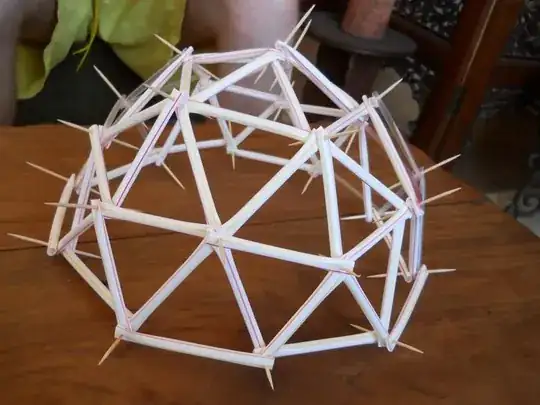I think the answer is yes but we have to examine why and how.
The nature of the target
First of all, we need to define what they're trying to colonize. Since Europa is the only world where we can assume, based on current knowledge, that such conditions would exist, I'm going to assume they're trying to colonize a world very close to it or that resembles it almost completely.
A few important things stand out - without an atmosphere, there's no chance of atmospheric breaking, but we also don't have to worry about overheating. If we go by Europa measurements, we're dealing with Moon-like conditions on the surface - temperatures at -150 to -170 Celsius[1] on the surface and a gravity about .1g (Europa has about .134g[1], but we'll assume .1g for simplicity). At the poles, the temperature might be down to -220, so it would be preferable to avoid them. It's also likely that, if there is any relationship between surface temperature and ice layer thickness, it'll be thinner farther from the poles, so again we're aiming for the equator. Overall, it would be preferable to avoid having to work on the surface - it'll be cheaper on the equipment and more efficient.
The ice layer is assumed to be about 30km deep on Europa[1] (although there's competing assumptions, this seems to be general consensus) which is damn thick. This means any ship can't just crash through or bomb the surface to get straight to the ocean. Even if that were possible, the water would evaporate explosively[2] (it would just boil instantly) - this may or may not be to the benefit of a lander that wants to reach the ocean, but it would be best to avoid it. Any effort will have to deal with the pressure difference eventually however.
The undersea world
The ocean itself shouldn't have a pressure too high for life or structures. This is because, even though Europa's oceans are presumed to be 100km deep[1] (10 times the maximum depth of ours, or 25 times the average), the gravity is about a tenth as strong, so it balances out to an uncomfortable but manageable 1030-1050 bars (bars are a bit less than an atmosphere in pressure). This is about the same as Earth's deep ocean floor[3], where there is vertebrate life so we know it's swimmable and survivable, albeit not unaided or without adaptations. This assumes a water density similar to that of ocean water on Earth - unless we're going to debate the possibility of non-earth-like life, we'd best stick with this estimate since we at least have a real example of it.
Underwater, there should be practically no light - so we're dealing with the same conditions deep ocean life has to deal with. An important difference from our oceans is that life would probably be denser at the floor rather than the "surface". This is because, since there's no sunlight or contact with the outside, all the nutrients will have to come from hydrothermal vents, underwater volcanism etc. . We need to count on these vents because they're going to be our best chance for power in this ocean. So, if they don't exist, there's probably very little life (so no food) and very few ways to generate power.
Comparing with Earth sizes
The surface area of Europa is approximately the same as Africa's[4]. Assuming the ocean is uniformly distributed and we don't have serious elevation differences, the surface area of the sea floor is the same, if everything south of Angola was gone. That should be plenty for a few hundred million people - Africa has a bit over a billion and it isn't that densely populated either (going by average density here).
Packing food and provisions
We also need to know what to take with us. Old estimates on how large a colony has to be where as low as a couple hundred people. However, newer estimates in 2013 place the number in the range of 15-45 thousand[5]- these estimates take illness, accidents etc. into account, which is what we need. Since we're prudent, lets assume we send about 2 times that many. That brings us to a minimum of 80 thousand individuals. To estimate basic habitation and food needs for all these, we can take our cues from the ISS[6][7][8] - extrapolating from their numbers (5kg food and water per day, per individual), we can conclude we need about 72e3 metric tonnes of food for a year, 142e3 if we're packing 80e3 people - lets round that up to 80e3 for convenience (thats 80 kilotons of food, 160 if we're sending 80 thousand colonists). That includes 70% water as well, which we'll normally be getting through refinement of oceanic water, but lets say we're really prudent and want to pack extra food or something. Just for kicks, the amount of food for 80 thousand without the water would be 21 kilotons.
Assuming 40e3 individuals surviving and a population growth of 1% (a bit less than Earth's I think) it would take 325 years to reach a million people and 560 years to exceed 10 million[9] (if all 80e3 survive, those numbers are 260 and 490 years respectively). Considering the amount of food we have to pack for a single year, if there isn't a sustainable habitat by the end of the first year, it's pretty much over, unless enough people die off to make the resources adequate for those that remain. We'll have to assume there's enough.
Only mutants can live in this world
So far it seems like it could be done. But what kind of adaptations would it require from individuals to be comfortable? Judging from how deep sea vertebrates have adapted, there's a few points that have to be made.
Firstly, there is going to be very little to no light - any creature would have to depend on other senses, sound being the best candidate. Also, the pressures require some softness - ocean-bottom life generally has few bones and more cartilage[3]. There is of course the issue of breathing - deep sea life has to deal with hypoxic conditions[3], but we have to assume there's enough oxygen to go around so we can have plenty of life, otherwise it's a dead end anyway, so we'll skip adapting to hypoxia and just consider breathing in water. Swimming adaptations would also be very beneficial.
Considering the above, I think that if this civilization's bioengineering is good enough, perhaps extra cartilage or turning most bones into cartilage would be an important step. I'd prefer extra cartilage, due to the fact that I'd rather not have a change that would give up the advantages of standing. This will probably be most useful on and around existing bones, so yeah we got fore-head ridges and all sorts of protrusions (but of course, I'm no biologist). For breathing, unless we are ok with having to gulp water to breathe, a preferable solution would be gulpers on the side of the jaw, like large slits on the cheeks (possibly quite long, from ear to chin to allow for a good volume of water), which instinctively work and close up (like sphincters) when outside water to prevent stuff from falling in. The gills need to be connected to these so they'd either be on the sides of the neck or the sides of the torso, since we want them to be close to both the gulpers and the heart. The torso is inconvenient and dangerous, so I'll go with the sides of the neck. They should be on the sides since they'll be shooting water out and that's preferable to placing them on the back, which can be problematic as well - the neck is easier to protect.
Since sound will be a lot more useful, some form of echolocation would be needed. The preferable way, in my opinion, would be to extend the ears so that their cartilage occupies a larger area on the head (yeah I know :P). A clicking mechanism is also required - it can be done with the mouth, which would be practical in some ways, but it might be better to have a separate organ for it. Lets just keep the mouth for now, which can create complex sounds already which might be useful. Finally, since sound will be important but it's likely vision is the most well-developed sense (and can pack information more efficiently), it might be a good idea to link the center for hearing and vision in the brain, a sort of engineered synesthesia[10], to empower it.
 "Seriously, forhead bumps?"
"Seriously, forhead bumps?"
A Vorta from Star Trek - this is what adapted ears might look like, sans the hair of course - that wouldn't help.
Swimming adaptations are problematic because webbing gets in the way and is the most obvious approach, short of giving up legs. Webbing in hands will reduce dexterity since now you can't pass anything between your fingers. Webbing amongst toes wouldn't be as much of an obstruction, but webbing between fingers can only do so much. Placing it between limbs can also be problematic. If you have large flaps on the side of your torso, you can't carry anything under-arm anymore and it can get in the way of so many activities (one might argue that if it's elastic or long enough it wouldn't be a problem, but the more elastic and flappy it is, the less help it is when swimming). Perhaps the only way would be to have webbing between the legs, which would give everyone a permanent skirt. Besides changing how clothing works, it might not be that much of a problem - most of the time would be spent swimming and if someone wanted to run, perhaps an adrenaline-triggered mechanism could be implanted, where, depending on whether the gills are working or not, the webbing between the legs tightens or relaxes. I don't really like this either though since sex would be a problem and it's inelegant. Maybe we'd have to settle for webbed (and probably longer) feet, to the extent that they don't cause problems with walking.
No smooth landings for us
The issue remains on how to get there, land, submerge and establish a habitat. I have one proposal that may be plausible enough for fiction.
The ships wouldn't land as much as impact the planet's surface. I'm thinking of something like a geodesic sphere or buckyball:


(source: amazonaws.com)
The reason I'm thinking of an impactor is because trying to land softly requires propulsion, which adds mass and complexity - also, you're not going to use it again ever so it seems impractical to pack it. If a steep enough trajectory can be accomplished, the impact can be softer. Although bouncing and achieving escape velocity isn't very likely, what might be likely is that the impactor bounces and places itself into orbit, which would be bad because it might take years for it to make contact again, at which point it might bounce again ad nauseam. So, to prevent this, along with an appropriate angle, the impactor should have spikes in all directions on the surface, deployable and retractable. As it makes contact with the surface, it can dig into the ice much like a tire using spikes or a boot. It will no-doubt roll, but that's tolerable.


To provide more control, we can separate the outer frame from the inner shell, which is our actual ship. The inner ship can rotate independently, allowing us to use gyroscopes and its rotation to cause the ball to roll in any direction. It could help the ship get out of a crater or spiky terrain and reach a flat surface. Europa's surface is relatively smooth, with "relatively" being the key-word - it is presumed that jagged kilometer-high ice shards exist on the surface.
Descent
To descend through the ice, the outer shell can heat itself up - I think about 600-1000 degrees Kelvin should work (about 300-700 degrees Celsius). The ice will probably just evaporate at this point, along with non-rocky impurities (metals will also evaporate[17]). The heating should cause the ice to break or recede slowly, hopefully turning into water or some composite liquid underneath the ball if it is sealing the hole sufficiently - otherwise it will be evaporating all around the ball. Spikes should be retracted during all this to allow descent.
There is a huge danger to be careful about when the ball reaches the ocean - at vacuum pressures, assuming the ocean has anything near our own ocean's density, it will evaporate violently. This can be a problem since it may be a powerful enough push to prevent descent into the ocean or shoot our ship back into orbit or farther. Even if it just keeps it there, it'll be insurmountable. To prevent this, we need to equalize pressure - I think a good way would be collapsing the ice from the sides of the tunnel during descent to have it clog the hole behind the craft. This is why it might have to descend at an angle. Heating can be focused in the direction of intended travel and small charges placed on the top-side of the tunnel to be blown after the ball has rolled deep enough. This way, the pressure differential should last much less time and hopefully be reduced to the point where the evaporation doesn't prevent sinking into the ocean.
Once the craft splashes in, it will take a long time to descend. It could be months (good thing we packed food!). This and previous stages, is why I think hibernation would be necessary, if not unavoidable. The impact and descent process can be handled automatically and space travel will probably take a long time anyway. This way, accidents can also be prevented - you don't want some guy who refused to strap themselves in for impact getting splattered and their pieces floating around during the whole process. If colonists aren't bio-engineered beforehand, the hibernation period might be a good chance to do that (to them :P) although I think doing it before launch would be much safer (obviously). If the colonists aren't hibernating during impact, put on some AC/DC, they'll need it.
After submersion
During descent, thermal emissions can be scanned for and targeted using gyroscopic turns to slowly move above them. The strongest should be the vents. The ball can also (and should) right itself at this point. The reason is convenience - if we separate the top and bottom halves of the sphere to habitat and power generation, the bottom half should land over or near a vent to harvest power off it while the habitat stays over it. For safety, it could also detach while staying tethered to the base through cables and ascend a few kilometers to avoid the possibly dense wildlife (and conditions) at the ocean floor. Since fish like to take bites out of power lines and there's other environmental dangers to consider, the cables should be heavily reinforced. They should also serve as ladders for colonists who need to descend to the power plant for repairs, maintenance or scouting. Of course, this is if they see a reason to make the halves detachable.
At the floor, around the vents, it should have enough sea life (including bacteria that feed off the vents and seem to be the equivalent of plants for deep ocean life) to eat and possibly farm as well. The habitat can soon be extended once mining and construction equipment is deployed, but there should be a few months time before that's necessary.
The landing spikes can help protect it from larger creatures, should they exist. Smaller ones probably won't be able to cause any serious damage.
edit - I've made an extremely primitive sketch of how it would work - it's quite terrible since sketchtoy caps out my cpu and the mouse behave erratically, but it might be better than nothing: http://sketchtoy.com/63258025
 "Seriously, forhead bumps?"
"Seriously, forhead bumps?"


